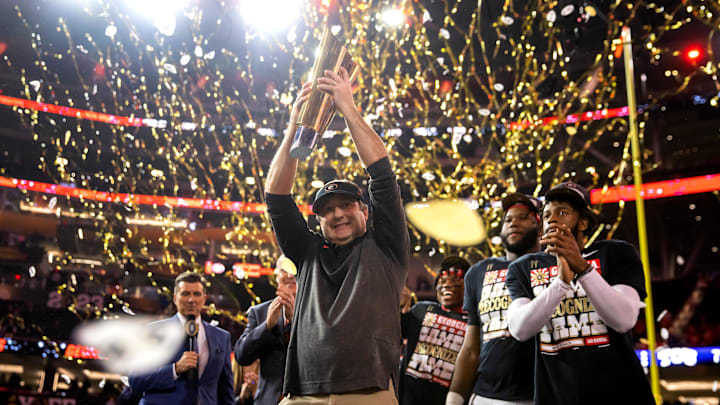It only took Kirby Smart two years to take Georgia to the College Football Playoff for the first time and back to the National Championship Game for the first time since the 1982 Sugar Bowl. The Alabama native restored his alma mater to greatness after taking the job in December of 2015 following Mark Richt’s 15-year tenure in Athens, and in 2021 broke through with the first of his back-to-back national titles.
So, how did Kirby Smart get back to Georgia in 2015 and why was he the exact right choice to replace Richt? Let’s take a look back at Smart’s coaching timeline from well before he was the newly-anointed patriarch of the SEC.
Playing career:
Before he was coaching the Bulldogs, Kirby Smart was a Bulldog and a four-year letterman at Georgia from 1995-98. Smart played defensive back and was named First-Team All-SEC as a senior. In his junior season, he led the team with six interceptions and again led the Bulldogs with five in 1998 as a senior.
Despite his success in college, Smart went undrafted in the 1999 NFL draft and though he was signed by the Indianapolis Colts as an undrafted free agent, he was released before the start of the season.
Early coaching career:
With his NFL dreams dashed, Smart returned to Georiga and became an administrative assistant in 1999. Then, after his one-year pitstop back in Athens, Smart became the defensive backs coach at Valdosta State. After just one season there, he was promoted to defensive coordinator for the 2001 season.
Following his brief tenure at Valdosta State, Smart went to learn under Bobby Bowden as a graduate assistant, quite a significant step back from defensive coordinator. Smart earned his master’s degree in physical education from FSU and was on the coaching staff for two seasons.
Following his two years under Bowden, Smart went to learn from another legend, though this one was still in the making. He became the defensive backs coach for LSU, a role of outsized importance and scrutiny on a Nick Saban-coached team.
Though clearly in the good graces of Bowden and Saban, Smart would continue to bounce around because 2004 was Saban’s last season at LSU before going to the NFL to coach the Miami Dolphins. Again, Smart retreated to Athens taking a job as the running back’s coach under Richt for one season, helping lead the Bulldogs to the SEC title, before joining Saban for his final year in Miami as the safeties coach.
Alabama:
Saban’s coaching style didn’t translate to the NFL and he couldn’t find a quarterback in Miami, so he returned to the SEC and brought Smart with him, this time as his defensive backs coach and assistant head coach.
Smart was Saban’s right-hand man at Alabama for nine seasons, serving as the defensive coordinator for seven of those. He quickly became one of the most celebrated assistant coaches in football, winning the Broyles Award in 2009 as the nation’s top assistant.
Smart became the highest-paid defensive coordinator in college football in 2013 and during his time in Tuscaloosa, he was a part of four national championships. His last title at Alabama came while he was splitting duties in 2015 after he was hired as the head coach at Georgia, helping lead the Crimson Tide through the College Football Playoff, something he would do as a head coach just two years later, eventually falling to his former boss in overtime of one of the most memorable games in college football history.
